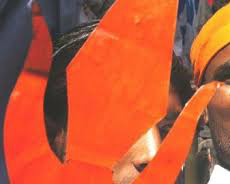Udupi, Aug 18: Even though many among the cow vigilantes who lynched an alleged cow trafficker to death in Udupi on August 17, did not know the fact that the victim was a BJP worker, those who led the attack knew him very well, reliable sources said.
 A group of around 30 people owing allegiance to Vishva Hindu Parishad and Bajrang Dal on Wednesday night attacked Praveen Poojary (29), and his aide Akshay Devadiga (22) near Hebri in Karkala taluk of Udupi district under the pretext of illegal cow transportation.
A group of around 30 people owing allegiance to Vishva Hindu Parishad and Bajrang Dal on Wednesday night attacked Praveen Poojary (29), and his aide Akshay Devadiga (22) near Hebri in Karkala taluk of Udupi district under the pretext of illegal cow transportation.
While Poojary, a known BJP activist in the region, breathed his last at a hospital, Devadiga is recuperating slowly. According to sources, a few among the assailants were waiting for an opportunity to “teach a lesson” to Poojary.
Meanwhile, Karnataka Home Minister G Parameshwara also said that prima facie cattle trade-related business dispute may be the reason behind the killing of the BJP worker.
"Many of the assailants have been arrested in connection with the incident. Police are suspecting some sort of a cattle trade-related business dispute," he said, adding police have taken up the case.
Noting that he does not see a communal angle to the incident "at this point of time", Parameshwara said "some reason must be there, we will find out". He said.
"... We don't know at this stage, but they are suspecting some sort of a dispute because of the trade, it is not definite, but they are suspecting. Investigation will give us the final picture."
Parameshwara also expressed concern over repeated incidents relating to beef and cattle trade in Karnataka. "We are vigilant; we will definitely try and maintain peace and order. I appeal to the people who are trying to create this kind of disturbance not to do this because we are a tolerant society and we should not create these kinds of issues," he said.
Also Read:
Leftists protest killing of BJP worker by gau rakshaks'; saffron party in shock
BJP worker's murder: Gau rakshaks tried to twist it into an accident case!
Udupi: VHP, Bajrang Dal activists kill BJP worker for transporting cows




Comments
Yes SUHA .......you are right .........he is advising as if they are partner in Trade.
Be A MAN Parameshwar............find out their father in this game and put him behind bars for life time .........then you see.
Clash between two terror groups is not a bad development in all ways. It may be useful to establish peace in society.
Read the advice given by home minister to the cow vigilantes. Talking as if they are his own family members. How sweet words he used!!!
As far as I know the victim was also a so called gau rakshaks. He used to actively take part in protests and other activities of VHP and BD in Karkala. I think this is purely a case of business dispute.
Yes. They know very well that cow cannot be their mother. They all are partners in illegal cattle transporting, selling and swallowing. Cow is always a handy pretext for them to execute their criminal plans like this.
Hindustan Zindabad... Violent Hindutva Murdabad..
Add new comment